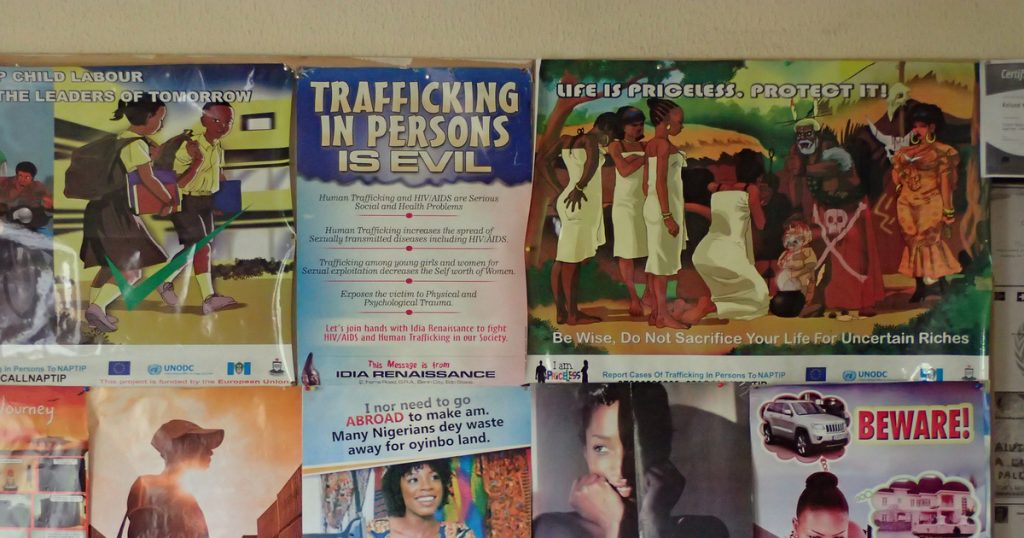Traditionally, when one imagines how someone ends up in slavery of any kind, one sees images of people being forcibly taken from their homes and sent to a foreign country, with absolutely no say in the matter. While this is usually the case in sexual slavery and for other kinds of bondage, it is no longer the case for women from Edo State in Nigeria, that provides 80% of women trafficked into Europe.1 Instead, there is a new phenomenon where women seek out passage to Europe through Madams, knowingly entering into prostitution. This was not always been the case, but extreme poverty, where some even lack running water, this practice has begun flourishing.2

Previously, recruiters lure women with tales of jobs in Europe, working for wealthy families, being hairdressers or nannies, only to find out the harsh reality of forced sex work once they arrived. Eventually, returning with embellished stories of wealth to tempt and recruit women themselves, completing the vicious cycle from victim to perpetrator. Some of the Madams even live in lavish houses, behind gates, as a testament of just what can be earned in European sex work. This show of wealth, in a desperate state, slowly began to transform just how women were recruited into the sex trafficking world.3
More recently, traffickers are being sought out by their victims in hope for a better life for themselves and their families.4 Little do they know of the harsh conditions and abuse they will endure before they can ever return home. After discussion of the “terms” of the work, the women sign legally binding contracts that say they will pay back rent, travel expenses, food, and other miscellaneous expenses, sometimes in a matter of months, sometimes in many years. These expenses total anywhere from 30,000 to 60,000 US dollars, on average. Usually, the women charge 5 to 10 US dollars per client, requiring them to work from sunup to sundown, and sometimes longer.5

Aside from relying on the signed contracts, Madams and pimps use the threat of violence against families, and religion, to keep the women from leaving.6 Using black magic referred to as JuJu, priests perform complex rituals that include eating raw chicken hearts, harm to oneself, drinking cocktails of their own fingernails, hair, and blood, as well as other methods, to bind the women with their traffickers. After completion of the rituals, they are made to feel that death, insanity, or harm will come to their families if they are to break their oath of repayment. A priest, who has benefited greatly from Madams and the pimps he has helped, stated in an interview that the purpose of these rituals are that “she never sleeps well or has peace of mind until she pays what she owes.”7

Furthermore, religion and belief in the negative effects that stem from the severance of the oaths have even led parents to become more complacent and insist that their daughters follow the requests of the people who are exploiting them.8 This, coupled with extreme poverty, exacerbate the growing phenomenon in Edo State, rendering it even more difficult to combat. Though, there are efforts to better the lives of women in Edo State. Education promotes agricultural development and other “basic needs industries,” and is central to the campaigns to inform about the horrors and negative effects of trafficking, and working toward the decriminalization, not legalization, of prostitution to help, instead of punish, those who have been ensnared in a vicious cycle of abuse which is making strides.9
New policies and rules are being implemented and promoted by grassroots organizations, and governments are taking notice. On November 15, 2000, the UN established a “Protocol to Prevent, Suppress and Punish Trafficking in Persons, Especially Women and Children, supplementing the United Nations Convention against Transnational Organized Crime,” which has 173 signatories, showing the world that these malum in se actions have become malum prohibitum or universally illegal, and punishable internaitonally.10 Even with all of these measures, and the recognition of this epidemic at an international level, there are still roughly 4.8 million people (19% of all humans trafficked) enslaved for sexual exploitation in the world, bringing in 99 billion dollars annually (66% of all profits from human trafficking).11 More must be done to end all forms of human trafficking, and it starts with a deeper understanding of the differing local and cultural patterns of recruitment throughout the world. Education and the provision of alternative work options remain the most powerful deterrents.
- Seema Kawar, From Benin City to the Shores of Italy: A New Hub of Human Trafficking, NAOC, (Accessed January 31, 2018), http://natoassociation.ca/from-benin-city-to-the-shores-of-italy-a-new-hub-of-human-trafficking/. ↵
- Abaobi Tricia Nwaubani, Cycle of exploitation turns Nigerian sex slaves in Italy into traffickers, News.trust.org, (Accessed February 12, 2018), http://news.trust.org/item/20161108000327-qfsaw/. ↵
- Abaobi Tricia Nwaubani, Cycle of exploitation turns Nigerian sex slaves in Italy into traffickers, News.trust.org, (Accessed February 12, 2018), http://news.trust.org/item/20161108000327-qfsaw/. ↵
- Abaobi Tricia Nwaubani, Cycle of exploitation turns Nigerian sex slaves in Italy into traffickers, News.trust.org, (Accessed February 12, 2018), http://news.trust.org/item/20161108000327-qfsaw/. ↵
- Esohe Aghatise, Iroko Onlus: Working to Combat the Trafficking of Nigerian Women and Girls Into Italy, Canadian Woman Studies 22, no. 3/4 (2003): 197-199, Humanities Full Text (H.W. Wilson), EBSCOhost (accessed January 31, 2018). ↵
- Esohe Aghatise, Iroko Onlus: Working to Combat the Trafficking of Nigerian Women and Girls Into Italy, Canadian Woman Studies 22, no. 3/4 (2003): 197-199, Humanities Full Text (H.W. Wilson), EBSCOhost (accessed January 31, 2018). ↵
- C. S. Baarda, Human trafficking for sexual exploitation from Nigeria into Western Europe: The role of voodoo rituals in the functioning of a criminal network, European Journal Of Criminology 13, no. 2 (2016): 257, Complementary Index, EBSCOhost (accessed January 31, 2018). ↵
- Abaobi Tricia Nwaubani, Cycle of exploitation turns Nigerian sex slaves in Italy into traffickers, News.trust.org, (Accessed February 12, 2018), http://news.trust.org/item/20161108000327-qfsaw/. ↵
- Esohe Aghatise, Iroko Onlus: Working to Combat the Trafficking of Nigerian Women and Girls Into Italy, Canadian Woman Studies 22, no. 3/4 (2003): 197-199, Humanities Full Text (H.W. Wilson), EBSCOhost (accessed January 31, 2018). ↵
- United Nations, Protocol to Prevent, Suppress and Punish Trafficking in Persons, Especially Women and Children, supplementing the United Nations Convention against Transnational Organized Crime, International Law & World Order: Westons & Carlsons Basic Documents, November 15, 2000, doi:10.1163/2211-4394_rwilwo_sim_033351. ↵
- Human Trafficking by the Numbers, Human Rights First, January 7, 2017. (Accessed February 12, 2018), https://www.humanrightsfirst.org/resource/human-trafficking-numbers. ↵



90 comments
Noah Laing
This article was well written and informative, as it showed how woman in Nigeria feel that they must use their body to provide for themselves and their family, which is very unfortunate. Human trafficking is a very serious issue today and I believe raising awareness to help eliminate it is very important and I believe this article certainly does that.
Cheyanne Redman
I find this article extremely informative and igniting. Many people are uneducated when it comes to other countries conditions and unfortunately Nigeria falls victim to that. No woman should ever sacrifice her body and herself to a terrible life in order to survive. It is so sad that the priest is involved in these terrible acts and even goes along with stating that they’d be killed if they do not cooperate. It is a terrible life to live and this article does a very excellent job with giving information on what is really happening in Nigeria.
Hannah Wilson
I would have liked to hear from a women who had escaped or got away from that business. I think it would be interesting to talk about it from their point of view, and what the conditions were like. Overall, t was a very interesting article. It is saddening that things like this happen everyday and no one is making a big issue about it. This type of trafficking is disturbing because they deceive girls into taking the job and once women realize what it is like they can not get out. Great article.
Kimberly Simmons
Human trafficking is a touchy subject, but I am so glad you addressed it in the way that you did! Not only was this article intriguing, but it was informative. One never realizes the true danger of trafficking until it is uncovered in this way; it is truly unfortunate to read of the violence, fear, and mental manipulation that is continually bestowed upon victims of this heinous crime.
Constancia Tijerina
This article is truly amazing yet heart breaking to help put into perspective of how the real world is, especially this women who are put into sex trafficking. These women had been brainwashed and forced into these practices with no help or any chance that they should escape this prison and torment . However, i believe this article really helps put into perspective of the real world and how there are way for that to be prevented. Over all. this article is remarkable thanks to all the extensive research and well written article; great work!
Monica Avila
Human trafficking is the modern form of slavery and it is disgusting. The fact that these women were forced to be sex slaves just to provide for their families is unbelievable. No-one deserved this kind of treatment, it is simply inhumane. Also, the fact that priests were allowed to perform rituals to bound the women to their pimps is really shocking. Men who are supposed to be on a higher plane of morality, were taking part in this inhumane ring of basic human trafficking. This article truly was very interesting!
Alexandra Cantu
It is extremely unfortunate that woman in Nigeria have to go through this. The women feel as if prostitution is the only way to get help and better their lives. We spend on our money on irrelevant things while these women are putting themselves in this horrible “job” just to provide for their families. I’m extremely grateful for the life I live. This was a well written article
Robert Rodriguez
This was a very well written informative article! It helped me open up my eyes to the serious issues that are happening around the world such as the sex trafficking mentioned in the article. its hard to imagine that these women are willing to give up their bodies just to make a living of only $5 to $10 U.S Dollars and still be under an unfair contract. it shocked me to see that other people helped lure others into prostitution by lying and promising a better life, its sad to see that. good job shedding light on a real world issue that happens too often..
Nathan Hudson
I found this article terrifying and necessary, the world must know about the evils in it or else they will never be stopped. Poverty can cause anyone to do anything, and this case is terrible. So many people are trapped in this terrible chain and it needs to be stopped. I did not know the amount of people in the cycle, but now I do. Thank you for a great article
Auroara-Juhl Nikkels
The women living in Nigeria deserve better living conditions. They should not have to choose to enter a life of slavery just to provide for their families. I think it is crazy that these priests would preform these rituals to keep the women bound to their pimps. Eating a raw chicken heart is crazy and disgusting. This is a priest. I feel like it is not right for them to bind these women to abusers and threaten to kill or harm their families if they leave. But that is the case that so many women face. So many of these women in the sex slavery industry are forces and coerced into staying, even after they decide that they want to leave. Good article!